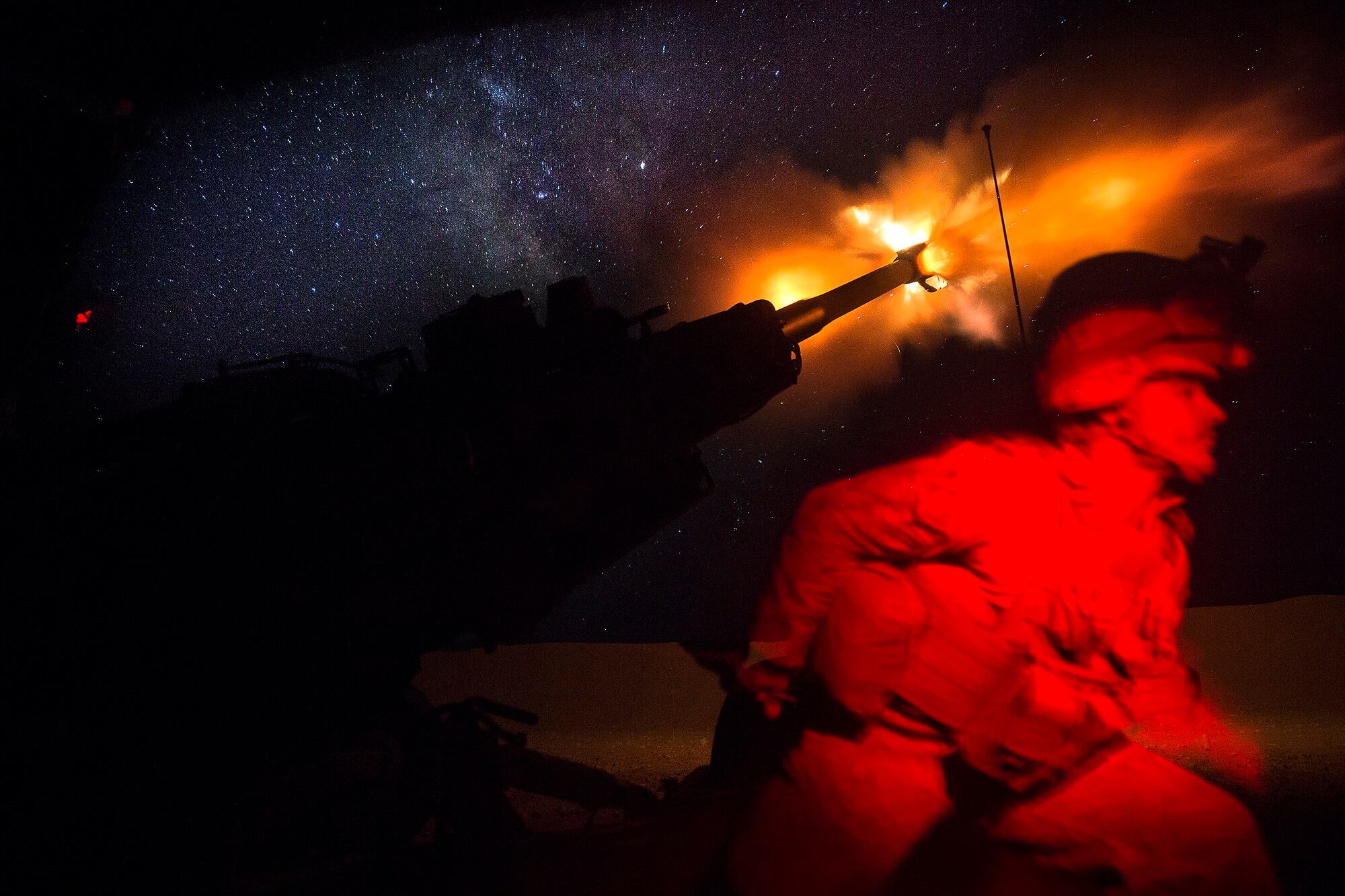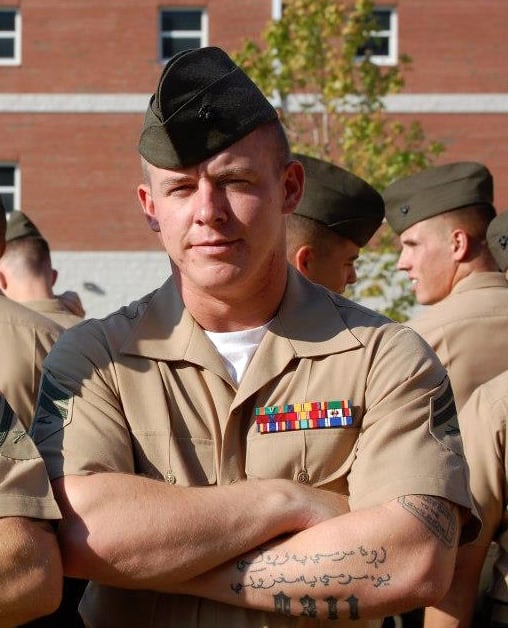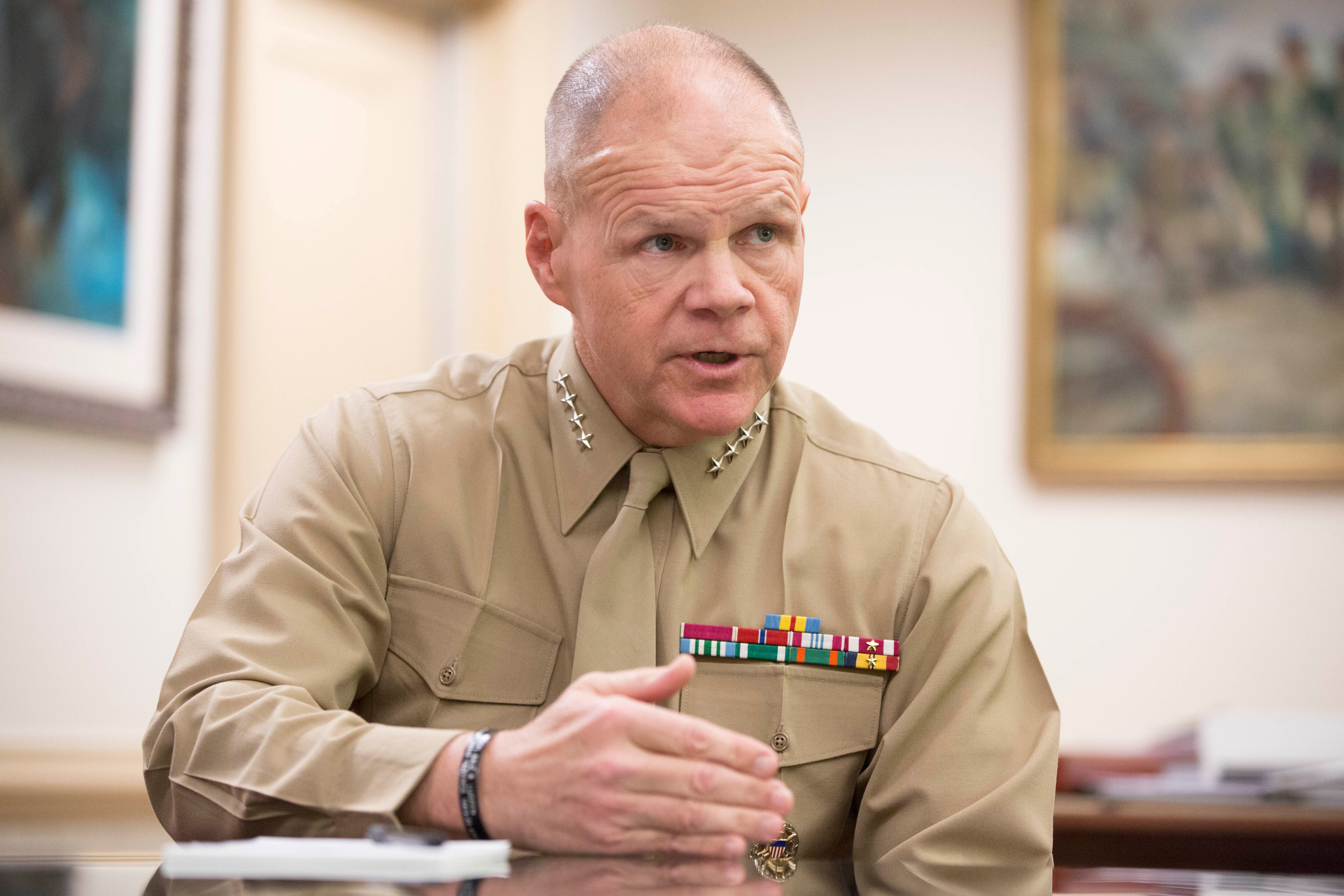Time may be the biggest factor causing combat veterans to leave the Marine Corps, but there’s another reason that should not be underestimated, some vets say: the Corps’ tattoo policy.
Brian Davenport was barred from re-enlistment in 2015 because two of his tattoos were so close together that they were considered to be one tattoo that was too big under the Marine Corps’ tattoo policy at the time, he said.
He and other Marines have a similar story: When the Marine Corps stopped deploying to Iraq and Afghanistan in large numbers, tattoos became a career killer for them, even if they had combat experience.
“As soon as we got back from Afghanistan and we found out we weren’t going to be going back, everything just did a complete 180,” Davenport told Marine Corps Times. “It was more stressing the little things: your uniform, appearances.”
RELATED

Davenport deployed to Afghanistan in 2012 as a machine gunner, but he felt the Marine Corps did not value his combat experience after he returned, he said.
“You had leaders saying, ‘We don’t care that you’re a combat veteran,’” he said. “I had a second lieutenant, he was brand new and he’s like: ‘No one cares about Afghanistan. That’s over. We’re moving on. There’s a new Marine Corps.’”
Davenport’s return from Afghanistan coincided with the Marine Corps’ drawdown from 202,000 to 182,000 active-duty Marines that was driven by cuts to defense spending.
On the day that Davenport found out that he could not re-enlist because of his tattoos, he went straight to an Army recruiter, who was able to get him into the Army two days after he left the Corps, he said.
During the drawdown from 202,000 Marines a few years ago, the Corps ratcheted up its enforcement of tattoo policies. Starting in 2014, Marines were required to submit photographs of their tattoos for re-enlistment.

Marine Corps Commandant Gen. Robert Neller has explained the reason for the Corps’ tattoo policy: “We are not in a rock and roll band. We are Marines. We have a brand. People expect a certain thing from us,” he told Marine Corps Times in February 2016.
Marine veterans often look to get jobs as police officers, but local, state and federal law enforcement agencies are very strict on whether applicants can have visible tattoos, Neller added.
In June 2016, the Marine Corps announced an updated tattoo policy, which allows visible tattoos to extend further on Marines’ upper arms and thighs. Although some Marines would have preferred a more lax policy, Neller certainly listened to their opinions on the matter, Sergeant Major of the Marine Corps Ronald Green said at the time.
“He’s allowed more skin area for tattoos in an effort to balance the Marines’ desires with the grooming standards of the Marine Corps,” Green told Marine Corps Times. “He wanted the policy to allow Marines freedom and flexibility to express themselves, while also being clearly written and understandable for both Marines and their leadership.”
RELATED

Neller has said that he has no plans to relax the Corps’ tattoo policy further.
In the year prior to the Marine Corps’ new tattoo policy being announced, only a fraction of Marines were denied re-enlistment because of their tattoos, said Maj. Garron Garn, a spokesman for Manpower & Reserve Affairs.
“From June 2015 to June 2016, there were more than 14,000 re-enlistment packages submitted; of these, there were 33 that were denied due to non-compliance with previous policies and the current tattoo order,” Garn told Marine Corps Times.
Those Marines were also told they could remove their tattoos if they paid for the procedure, Garn added. Marines are now told what the consequences are of getting a tattoo that violates policy, such as not being allowed to re-enlist.
Still, former Gunnery Sgt. Matthew Martin said he believes the tattoo policy has unfairly ended good Marines’ careers.
“I’ve seen guys that all they wanted to do was have a career in the Marine Corps, who were cast over or re-enlistment were made very difficult because of the tattoo policy,” said Martin, who left the Corps in 2013 after 15 years.
Martin joined the Marine Corps in 1998 and went on to serve in Marine Corps Forces Special Operations Command, he said. Having experienced both war and peace, he believes the Marine Corps was more of a meritocracy during the height of the Iraq war.
“Peacetime Marine Corps sucks,” he said.
In 2015 Sgt. Daniel Knapp, an infantry Marine who had received two meritorious promotions, was denied re-enlistment for a tattoo on his forearm even though he had a policy waiver endorsed by his command.
“When I was in Afghanistan, my tattoos never stopped me from shooting anyone, and they never made me more of a target,” Knapp told Marine Corps Times at the time. “They never stopped me from keeping Marines safe. On patrol nothing ever happened because of my tattoos.”
RELATED

Officials say just as Marines are expected to meet the highest physical standards, the Corps also sets high standards for Marines’ professional military appearance.
“There is a reason why Marine Corps recruiting has remained so successful throughout the years,” Green said in June 2016. “When you ask Marines why they chose the Corps, most will tell you because they wanted to be different. They wanted to be part of something better than self — they wanted to be a part of a team.”
Still, the Marines are stricter than the Army, which does not limit how big or how many tattoos soldiers can get. The Navy allows sailors to get inked on their necks and behind their ears.
The tattoo policy hasn’t stopped one Marine veteran from trying to get back into the Corps for the past five years. But every recruiter he has talked to has said no because of the two sleeve tattoos he has that run the length of both arms.
The veteran, who asked not to be identified, left the Corps in 2009 as a sergeant after deploying to Iraq in 2007 and 2008 as a logistics Marine. Although he has had a good life as a civilian, he misses being able to serve, he said.
“The only thing that I can’t find in civilian life is being a Marine, deploying, doing that thing,” he said. “There’s nothing else to it. You can’t do that anywhere else.”




